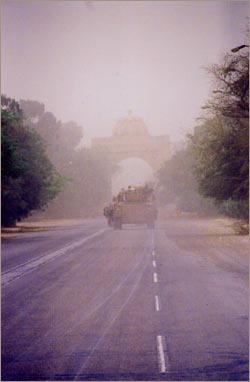 |
 |  |
|||||
 |
Home | The Sunni Heartland | The Unexpected War | Paying the Price |
|||||
|
Paying the Price Reassessing the Cost But back on May 1, it all seemed so clear, so simple, when President George Bush declares major combat over - standing on the deck of an aircraft carrier off the coast of California.
It was a million dollar photo-op, but within months of the President's declaration, almost every assumption Washington made before the war had been proved wrong. The collapse of every institution in the Iraq came as surprise. The price of this war will come from American pockets. The massive bill for rebuilding Iraq will come due long before Iraq's oil fields provide crude and cash to pay for the reconstruction, and the unexpected war after the war, that began in the Sunni Arab heartland of central Iraq, threatens to engulf the country.
"Most Iraqis wanted Saddam Hussein gone," Galbraith continues, "But...most Iraqis don't want to be ruled by the United States and they do not want a long term American presence...This is an ancient culture. It isn't an ancient country, but it's an ancient culture in which the Iraqis are rightly proud. And they want to run their own affairs. They do not want to be treated like a colony." In September, the president outlined the cost of the Iraq war for the first time, more than $80 billion dollars for this year alone. That's a billion dollars each week just for the military operation - and billions more to stabilize the country. And almost every day, another American military casualty. Here, American soldiers stand and pay their last respects - a pair of boots, an empty helmet balanced on a rifle - a reminder of another price for post-war Iraq. A price, says James Dobbins, that is higher than it needed to be. "After all," explains James Dobbins, "This is the sixth major nation-building operation the U.S. has mounted in 12 years. Five of which have been in Muslim countries. We really should be getting better at this." |
||||||
